英语写作焦虑
英语学习中五种常见的焦虑及应对建议
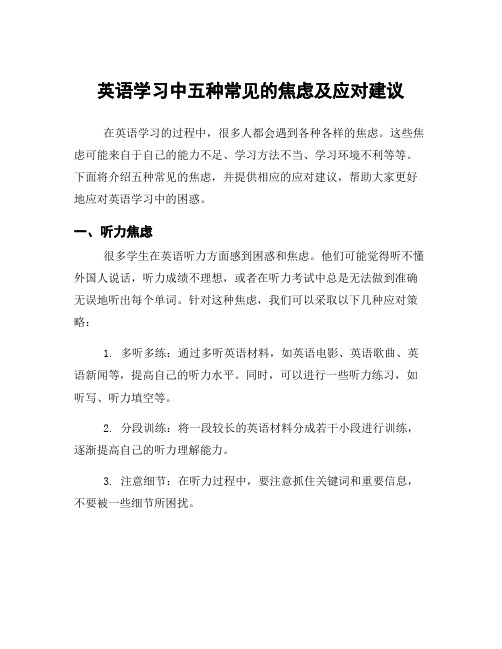
英语学习中五种常见的焦虑及应对建议在英语学习的过程中,很多人都会遇到各种各样的焦虑。
这些焦虑可能来自于自己的能力不足、学习方法不当、学习环境不利等等。
下面将介绍五种常见的焦虑,并提供相应的应对建议,帮助大家更好地应对英语学习中的困惑。
一、听力焦虑很多学生在英语听力方面感到困惑和焦虑。
他们可能觉得听不懂外国人说话,听力成绩不理想,或者在听力考试中总是无法做到准确无误地听出每个单词。
针对这种焦虑,我们可以采取以下几种应对策略:1. 多听多练:通过多听英语材料,如英语电影、英语歌曲、英语新闻等,提高自己的听力水平。
同时,可以进行一些听力练习,如听写、听力填空等。
2. 分段训练:将一段较长的英语材料分成若干小段进行训练,逐渐提高自己的听力理解能力。
3. 注意细节:在听力过程中,要注意抓住关键词和重要信息,不要被一些细节所困扰。
很多学生在英语口语方面感到焦虑,他们可能觉得自己的口语表达能力不足,无法流利地用英语进行交流。
针对这种焦虑,我们可以采取以下几种应对策略:1. 多说多练:通过多与他人进行英语口语交流,提高自己的口语表达能力。
可以参加英语角、找外教进行口语练习等。
2. 模仿学习:可以模仿一些标准的英语口音和表达方式,通过模仿来提高自己的口语水平。
3. 多积累词汇和句型:通过积累更多的词汇和常用句型,可以更好地表达自己的意思。
三、阅读焦虑很多学生在英语阅读方面感到困惑和焦虑。
他们可能觉得阅读速度慢,理解能力差,或者在阅读考试中总是无法做到准确无误地理解每个句子。
针对这种焦虑,我们可以采取以下几种应对策略:1. 多读多练:通过多读英语材料,如英语文章、英语小说等,提高自己的阅读水平。
同时,可以进行一些阅读练习,如阅读理解题等。
2. 划重点:在阅读过程中,要注意划重点,抓住关键词和重要信息。
3. 扩大词汇量:通过积累更多的词汇,可以更好地理解文章的意思。
很多学生在英语写作方面感到焦虑,他们可能觉得自己的写作能力不足,无法准确地表达自己的意思。
英语 如果你感到焦虑你该做作文
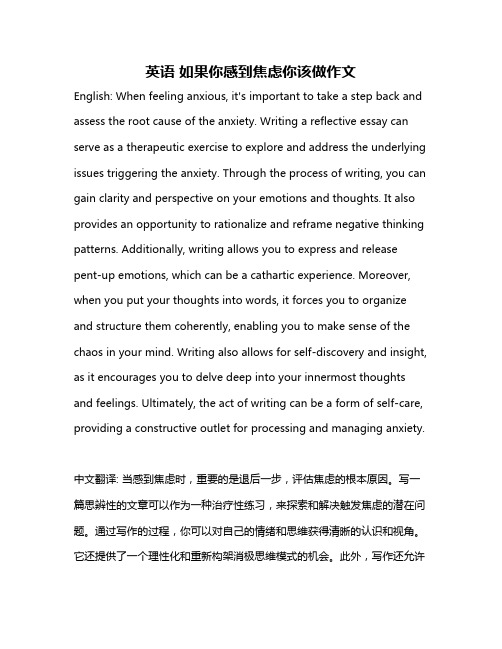
英语如果你感到焦虑你该做作文English: When feeling anxious, it's important to take a step back and assess the root cause of the anxiety. Writing a reflective essay can serve as a therapeutic exercise to explore and address the underlying issues triggering the anxiety. Through the process of writing, you can gain clarity and perspective on your emotions and thoughts. It also provides an opportunity to rationalize and reframe negative thinking patterns. Additionally, writing allows you to express and release pent-up emotions, which can be a cathartic experience. Moreover, when you put your thoughts into words, it forces you to organize and structure them coherently, enabling you to make sense of the chaos in your mind. Writing also allows for self-discovery and insight, as it encourages you to delve deep into your innermost thoughts and feelings. Ultimately, the act of writing can be a form of self-care, providing a constructive outlet for processing and managing anxiety.中文翻译: 当感到焦虑时,重要的是退后一步,评估焦虑的根本原因。
英文作文焦虑

英文作文焦虑**Anxiety in English Writing: Exploring Its Roots and Coping Strategies**In the realm of academic challenges, anxiety surrounding English writing stands out as a significant obstacle for many students. This anxiety often manifests as fear, nervousness, and even avoidance of writing tasks, leading to a decrease in motivation and engagement. To address this issue, it is crucial to delve into the roots of this anxiety and explore effective coping strategies.**Roots of English Writing Anxiety**The sources of anxiety in English writing are multifaceted and vary from individual to individual. However, several common themes emerge. One significant factor is the fear of not being able to express oneself effectively in English. This fear often stems from a lack of confidence in language proficiency, which can be exacerbated by the perception that English is a foreign language and, therefore, more difficult to master.Another root of anxiety is the pressure to perform well academically. In many school systems, English writing is a key component of assessments and exams, and poor performance can have significant consequences. This pressure can lead to feelings of inadequacy and failure, further perpetuating the cycle of anxiety.Furthermore, the nature of writing tasks themselves can contribute to anxiety. Writing requires a significant amount of cognitive effort, including generating ideas, organizing thoughts, and choosing appropriate vocabulary and grammar. This cognitive load can be overwhelming for students who struggle with these tasks, leading to feelings of anxiety and helplessness.**Coping Strategies for English Writing Anxiety**While the roots of English writing anxiety may be deep-seated, there are several strategies that students can employ to overcome it. Firstly, it is important to recognize and accept that anxiety is a normal emotion. By acknowledging its presence, students can take a more proactive approach to managing it.One effective strategy is to break down writing tasks into smaller, more manageable chunks. This approach helpsto reduce the cognitive load associated with writing and makes the process less daunting. Students can start by brainstorming ideas, then outline their thoughts, and finally, focus on writing the actual draft.Practicing regularly is also crucial. By writing regularly, students can improve their proficiency inEnglish and build confidence in their writing abilities. This practice can take various forms, such as journaling,参与英语写作俱乐部,或者 simply writing essays for school assignments.Another helpful strategy is to seek feedback andrevision opportunities. Writing is a iterative process that involves receiving and incorporating feedback to improvethe quality of the text. By seeking feedback from teachers, peers, or online writing communities, students can gain insights into their writing strengths and weaknesses and make necessary improvements.Lastly, students can utilize relaxation techniques to manage their anxiety. Deep breathing, mindfulness exercises,and other relaxation methods can help to calm the nervous system and reduce feelings of anxiety. By integrating these techniques into their writing routine, students can approach writing tasks with a more calm and focused mindset. In conclusion, anxiety in English writing is a complex issue that requires a multifaceted approach to address. By understanding its roots and exploring effective coping strategies, students can overcome this anxiety and develop into confident and proficient writers. With practice and perseverance, the challenges of English writing can be overcome, and the rewards of clear and effective communication can be realized.**英文作文焦虑:探索其根源与应对策略(中文翻译)** 英文作文焦虑对于许多学生来说是一个重要的学术挑战。
英语续写表达焦虑担忧
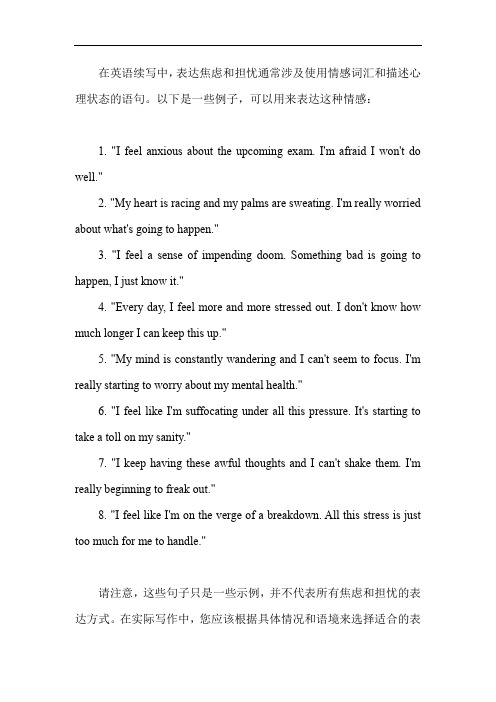
在英语续写中,表达焦虑和担忧通常涉及使用情感词汇和描述心理状态的语句。
以下是一些例子,可以用来表达这种情感:1. "I feel anxious about the upcoming exam. I'm afraid I won't do well."2. "My heart is racing and my palms are sweating. I'm really worried about what's going to happen."3. "I feel a sense of impending doom. Something bad is going to happen, I just know it."4. "Every day, I feel more and more stressed out. I don't know how much longer I can keep this up."5. "My mind is constantly wandering and I can't seem to focus. I'm really starting to worry about my mental health."6. "I feel like I'm suffocating under all this pressure. It's starting to take a toll on my sanity."7. "I keep having these awful thoughts and I can't shake them. I'm really beginning to freak out."8. "I feel like I'm on the verge of a breakdown. All this stress is just too much for me to handle."请注意,这些句子只是一些示例,并不代表所有焦虑和担忧的表达方式。
什么制造了焦虑英语作文
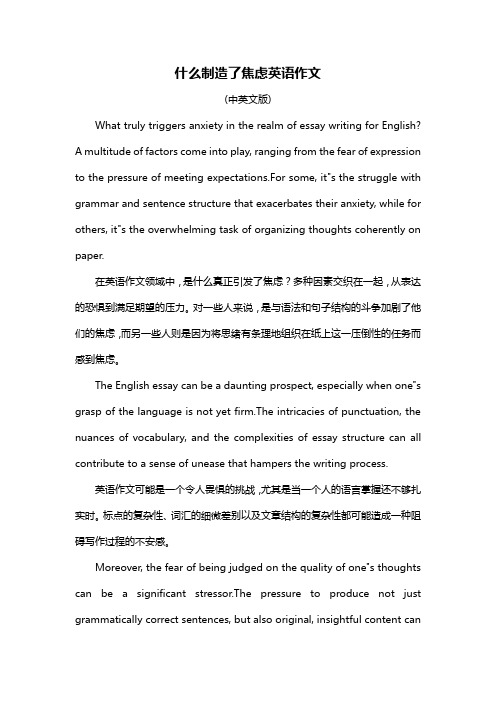
什么制造了焦虑英语作文(中英文版)What truly triggers anxiety in the realm of essay writing for English?A multitude of factors come into play, ranging from the fear of expression to the pressure of meeting expectations.For some, it"s the struggle with grammar and sentence structure that exacerbates their anxiety, while for others, it"s the overwhelming task of organizing thoughts coherently on paper.在英语作文领域中,是什么真正引发了焦虑?多种因素交织在一起,从表达的恐惧到满足期望的压力。
对一些人来说,是与语法和句子结构的斗争加剧了他们的焦虑,而另一些人则是因为将思绪有条理地组织在纸上这一压倒性的任务而感到焦虑。
The English essay can be a daunting prospect, especially when one"s grasp of the language is not yet firm.The intricacies of punctuation, the nuances of vocabulary, and the complexities of essay structure can all contribute to a sense of unease that hampers the writing process.英语作文可能是一个令人畏惧的挑战,尤其是当一个人的语言掌握还不够扎实时。
笔友考试前焦虑安慰英语作文

笔友考试前焦虑安慰英语作文English:Before taking the exam, it is completely normal to feel anxious and stressed. Remember that these feelings are natural and almost every student goes through them. It is important to manage your anxiety by practicing relaxation techniques such as deep breathing, meditation, or visualization. Additionally, make sure to get enough rest, eat a healthy meal, and stay hydrated. Remember to be well-prepared by studying and reviewing your materials, but also trust in your abilities and hard work. In the end, try to stay positive and believe in yourself. Good luck - you've got this!中文翻译:在考试前感到焦虑和压力是完全正常的。
记住这些感受是自然的,几乎每个学生都经历过。
重要的是通过练习放松技巧,如深呼吸、冥想或可视化来管理焦虑。
此外,确保充分休息,吃健康的餐食并保持水分补充。
记得通过学习和复习材料来做好准备,但也要相信自己的能力和努力。
最后,保持积极态度并相信自己。
祝你好运 - 你一定可以的!。
英语作文应对焦虑
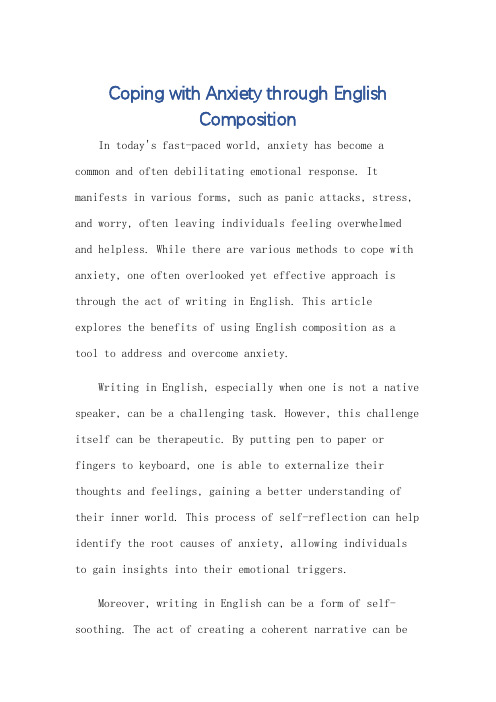
Coping with Anxiety through EnglishCompositionIn today's fast-paced world, anxiety has become a common and often debilitating emotional response. It manifests in various forms, such as panic attacks, stress, and worry, often leaving individuals feeling overwhelmed and helpless. While there are various methods to cope with anxiety, one often overlooked yet effective approach is through the act of writing in English. This article explores the benefits of using English composition as atool to address and overcome anxiety.Writing in English, especially when one is not a native speaker, can be a challenging task. However, this challenge itself can be therapeutic. By putting pen to paper or fingers to keyboard, one is able to externalize their thoughts and feelings, gaining a better understanding of their inner world. This process of self-reflection can help identify the root causes of anxiety, allowing individuals to gain insights into their emotional triggers.Moreover, writing in English can be a form of self-soothing. The act of creating a coherent narrative can becalming, as it helps organize scattered thoughts and brings a sense of closure to emotional experiences. This closure can provide a sense of relief, reducing the intensity of anxiety.Additionally, writing in English can serve as a form of communication. Sharing one's thoughts and feelings through writing can be a powerful way to connect with others. This connection can lead to a sense of support and understanding, which can be extremely helpful in reducing the isolationand loneliness that often accompany anxiety.Finally, writing in English can help build confidence. As one improves their writing skills, they also improvetheir ability to express themselves effectively. This enhanced communication ability can lead to a sense of accomplishment and empowerment, which can help boost one's self-esteem and reduce feelings of helplessness.In conclusion, while writing in English may initially seem like a daunting task for those who are not native speakers, it can actually be a powerful tool in coping with anxiety. Through self-reflection, self-soothing, communication, and confidence building, writing in Englishcan help individuals gain control over their emotional lives and overcome the grip of anxiety.**用英语写作应对焦虑**在当今快节奏的社会中,焦虑已成为一种常见的、往往使人衰弱的情绪反应。
二语写作焦虑与三个学习者因素之间关系的路径分析研究

二语写作焦虑与三个学习者因素之间关系的路径分析研
究
摘要
英语作文的写作能力是语言能力的重要组成部分,在教学中被广泛用作课程的一种重要评估方式。
一般而言,学生在完成英语写作任务前就会出现焦虑情绪。
为了解英语作文写作焦虑与学习者因素之间的关系,本研究以220位参与者(年龄为18-21岁)参加的路径分析进行调查分析。
研究发现,英语写作焦虑与三个学习者因素(英语水平、自信水平和思维模式)之间存在着负相关的关联,即:英语写作焦虑程度较高的受试者,其英语水平、自信水平和思维模式往往较低。
此外,研究还发现,英语水平和思维模式的影响程度要大于自信水平的影响程度,这两个因素对英语写作焦虑的影响要大于自信水平的影响。
结论:英语写作焦虑与三个学习者因素之间存在负相关的关联,英语水平和思维模式的影响程度较大,自信水平的影响程度较小。
本研究为帮助学生克服写作焦虑并取得更好的英语写作成绩提供了重要的研究结果,同时也为今后的研究工作提供了有益的线索。
关键词:英语写作焦虑,路径分析,学习者因素
An Analysis of the Paths Between English Writing Anxiety and Three Learner Factors: A Path Analysis Study
Abstract。
- 1、下载文档前请自行甄别文档内容的完整性,平台不提供额外的编辑、内容补充、找答案等附加服务。
- 2、"仅部分预览"的文档,不可在线预览部分如存在完整性等问题,可反馈申请退款(可完整预览的文档不适用该条件!)。
- 3、如文档侵犯您的权益,请联系客服反馈,我们会尽快为您处理(人工客服工作时间:9:00-18:30)。
红河学院本科毕业论文(设计)附件12014年度本科生毕业论文(设计)英语写作焦虑在英语专业学生的调查院-系:外国语学院专业:英语年级:2010级学生姓名:殷茂玉(组长)学号:201006050138导师及职称:钟宝霞(讲师)2014年5月2014Annual Graduation Thesis (Project) of the College UndergraduateAn Investigation of English WritingAnxiety Among English MajorsDepartment:College of Foreign LanguagesMajor:EnglishGrade:2010Student Name:Yin mao yuStudent No.:201006050138Tutor:Lecturer Zhong Bao XiaFinished by May, 2014毕业论文(设计)原创性声明本人所呈交的毕业论文(设计)是我在导师的指导下进行的研究工作及取得的研究成果。
据我所知,除文中已经注明引用的内容外,本论文(设计)不包含其他个人已经发表或撰写过的研究成果。
对本论文(设计)的研究做出重要贡献的个人和集体,均已在文中作了明确说明并表示谢意。
作者签名:日期:毕业论文(设计)授权使用说明本论文(设计)作者完全了解红河学院有关保留、使用毕业论文(设计)的规定,学校有权保留论文(设计)并向相关部门送交论文(设计)的电子版和纸质版。
有权将论文(设计)用于非赢利目的的少量复制并允许论文(设计)进入学校图书馆被查阅。
学校可以公布论文(设计)的全部或部分内容。
保密的论文(设计)在解密后适用本规定。
作者签名:指导教师签名:日期:日期:ABSTRACTWith Daly, Horwitz and Y-S-Cheng’s theoretical model of second language writing anxiety as research framework, this thesis surveyed English majors’English writing anxiety. Findings of the present study show that all of the English major students experience English writing anxiety. There is no significant difference in English anxiety among students from three different grades. There is significant difference in English writing anxiety between the students who hold positive attitudes towards English writing and those who hold negative attitudes towards English writing and there is significant difference in English writing anxiety among students who rated their English writing good, average and bad. Results from the qualitative study show the reasons why there is little difference in English writing anxiety among students from three different grades. What’s more, it is shown that the poor writing skills, cognitive anxiety, test anxiety and erroneous beliefs toward English writing are the main sources of English writing anxiety.Key words:English writing anxiety; English major students; gradeTABLE OF CONTENTS1. INTRUDUCTION1.1 The Background Information of This Study1.2 The Purpose and Significance of This Study2. LITERITURE REVIEW2.1 Definition of Writing Anxiety2.2 Empirical Studies of Writing Anxiety Home and Abroad3. RESEARCH DESIGN3.1 Research Questions3.2 Subjects3.3 Research Instruments3.3.1 The background information3.3.2 Questionnaire (SLWAI)3.3.3 Interview3.4 Data Collection and Analysis3.4.1 Questionnaire3.4.2 Interview4. RESULT AND DISCUSSION4.1 Results from The SLWAI4.2 Results from The Interview4.3 Discussion4.3.1 English writing anxiety experienced by English majors4.3.2 Difference in English writing anxiety among different grades4.4 Sources of English Writing Anxiety Among Different Grades4.4.1 Test anxiety4.4.2 Poor writing skill4.4.3 Being afraid of negative evaluation (Cognitive Anxiety)5. CONCLUIONS1.INTRUDUCTIONMany studies have shown that affect-related factors, including anxiety, attitude and motivations have great impact on foreign language learning. Among these factors, anxiety, which can also be called apprehension or fear, has drawn great attention of researchers since the 1970s. Second language researchers and theorists have been aware that anxiety often appears during the process of language learning, especially foreign language learning, and consequently affects the learning achievements. According to Horwitz and her colleagues (1986), foreign language anxiety is the threat to an individual’s self-concept caused by the inherent limitation of communicating in an imperfectly mastered second language. From their viewpoint, foreign language anxiety is clearly associated with listening and speaking. Many researchers have carried out studies both at home and abroad in this area.2 LITERATURE REVIEW2.1 Definition of Writing AnxietyThe term“writing apprehension”was first proposed by Daly & Miller in 1975. They defined writing apprehension as“a situation and subject-specific individual difference that is concerned with a person’s general tendency to approach or avoid writing accompanied by some amount of evaluation.”Writing anxiety involves“anxiety with writing situations, frustration, and low productivity while writing”(Scott&Rodwell,1997:47).2.2 Empirical Studies of Writing Anxiety Home and AbroadDaly & Miller(1975b)found that in educational settings writ⁃ing apprehension affects student satisfaction in courses requiring writing, expectations of success in writing classes, enrollment patterns in advanced composition courses, and enjoyment of out of class projects ostensibly demanding s ome writing. In Daly’s (1977) study, writers with low level of writing anxiety produced three times more words than those with high level of writing anxiety. Additionally, there were significantly more paragraphs, more sentences, more nouns, pronouns, adjectives, and prepositional phrases in the articles written by writers with low level of writing anxiety, whereas writers with high level of writing anxiety made more spelling errors than low-anxiety ones. Lee&Krashen(1997) reported that native speakers of Chinese in Taiwan with higher writing apprehension tend to receive lower evaluations on the composition section of senior high school examination.In 2004, Cheng designed a measurementtool named Second Language Writing Anxiety Inventory (SLWAI), which was e specially used to measure foreign/second language writing anxiety. What’s more, it was tested that there are high validity and reliability in SLWAI. With the help of SLWAI, Atay&Kurt(2006) made a study of English writing anxiety of Prospective teachers (PTs) in Turkey. Results of the SLWAI showed that more than half of the participating PTs had high or average writing anxiety. PTs responses to the open- ended questionnaire indicated that those with high and average anxiety had difficulties in organizing their thoughts and producing ideas while writing in L2. In addition, PTs considered universities instructors and their past L2 writing experiences as the major factor affecting their attitudes towards L2 writing, and discussed the psychological and physiological reactions that had during the writing process. Finally, the responses of the PTs revealed that their writing experiences may affect their future teaching practices.In China, Zhou&Tang(2010) investigated the influence of foreign language writing anxiety on writing process. Data analysis showed that L2 writing anxiety was negatively correlated with the composition scores but positively correlated with L1 interference as coded in the thinking-aloud process. Guo&Qing (2010) reported an empirical study on foreign language writing anxiety of 453 Chinese non-English majors by means of SLWAI and interviews. The study reveals that (1) the non-English majors students experience moderate foreign language writing anxiety, and one anxiety factor, avoidance behavior, is of high frequency; (2) the students from high and low anxiety groups and each anxiety factor exhibit significant differences inwriting performance; (3) there are significantly negative correlations between writing performance and all four anxiety fact ors; (4) the students’self-perceptions of foreign language writing ability and overall foreign proficiency have significant effects on their writing anxiety.3 RESEARCH DESIGN3.1 Research QuestionsWe mainly explore the following two questions in the present study.1) Do English major students experience writing anxiety in English? If they do, to what extent do they reach?2) What is the difference in English writing anxiety level among students in different grades?3.2 SubjectsThe subjects in the present study come from a normal university in central China. The total amount of the subjects is 220 who major in the same major English. They are from six natural classes in different grades and 77 freshmen, 78 sophomores and 65 juniors are all chosen randomly. They have learned English for at least 6 years. Of them there are 44 male students and the rest are 176 female students. Their average age is 18.5 years old.3.3 Research InstrumentsThe instruments are composed of three sections: background information, Second Language Writing Anxiety Inventory (SLWAI) and interview .3.3.1 The background informationThe background information is designed to collect information about various aspects of learner differences, including subjects’name, age, and grade.3.3.2 Questionnaire (SLWAI)The Second Language Writing Anxiety Inventory (SLWAI) designed by Cheng (2004) is an instrument that measures the degree to which a student feels anxious when writing in English. This SLWAI contains twenty-two items falling into three factors. To facilitate the subjects to understand and respond, the questionnaire is translated into Chinese without any amendment. It adopts a five-point Likert response format (1=strongly degree; 2=disagree; 3=neither agree nor disagree; 4=agree; 5=strongly disagree). Seven of them (Items 1,4,7,17,18,21,22) are negatively worded and required reverse scoring before being summed up to the total scores.In her study, Cheng(2004) demonstrated that the total scale and factors of the SLWAI had good internal consistency reliability (ɑ=.91), respectable test-retest reliability (r=.85) and adequate convergent and discriminant validity, and satisfactory criterion-related validity.3.3.3 InterviewThere are two open-ended questions in this part. Q1: Is it difficult for you to finish an English composition? And why? Q2: Can you feel the tense when you are asked to write an English composition? And Why?3.4 Data Collection and Analysis3.4.1 QuestionnaireIn the process of data collection, the total amount of the questionnaires handed out is 220, and all of them were collected. Because the students were very cooperative and carefully finished the questionnaire, all of the 220 copies were valid. Later, all the original data was typed into computer by the author and another postgraduate. Since then, after seven items of SLWAI requiring reverse scoring were dealt with appropriately, all the data were collected and edited by excel, and the results were analyzed by SPSS17.0 in terms of descriptive statistics,One-Way mean analysis, and correlation analysis.By using a median split procedure, the subjects whose mean of English writing anxiety is lower than 2.5 are classified into low-anxiety group, and those whose mean of English writing anxiety is higher than 3.5 are classified into high-anxiety group. And those whose mean of English writing anxiety is between 2.5 and 3.5 fell into moderate –anxiety group.3.4.2 InterviewIn processing the data of interview, the students’ interviews were analyzed and discussed based on the questions in the interview. The author reviewed all the data and made a summary of all the subjects’ responses and then summarized them into several categories, which were followed by several examples taken by the students in the responses. After making sure all the data from the interview were analyzed, they were further translated into English for the interview was recorded in Chinese.4 RESULTS AND DISCUSSION4.1 Results from the SLWAIIn order to know the English writing anxiety of different grades, descriptive statistics of SLWAI among three grades are needed. In order to learn whether there is any difference on means of English writing anxiety among three grades, one-way ANOV A is also necessary. At last, comparisons of means of English writing anxiety between two grades can show whether there is any difference on English writing anxiety between different grades.Table 1 Descriptive statistics of SLWAITable 2 One-way ANOV A of writing anxiety of the three differentgrades of English majorFrom table 1 and table 2, the mean of all the participants’ writing anxiety level is 3.18, and those of freshmen, sophomores and juniors are 3.12, 3.25 and 3.17respectively. Therefore it can be found that Chinese college students of different grades in English major students experience writing anxiety when writing compositions in English. One-way ANOV A indicates that there is no significant difference in writing anxiety level among different grades in English major.4.2 Results from the InterviewTable 3 The percentage of the first open-ended questionIn answering the first open-ended question, 61.36%of the students think that it is difficult to write compositions in English, but there are some differences among different grades. 55.84% of freshmen think it is not difficult to write compositions in English, while more than 70%of sophomores and juniors believe it difficult to write compositions in English.The followings are the reasons why more than half of freshmen think it not difficult to compose English essays and why more than 70%of sophomores and juniors believe it difficult to write English compositions. The reasons why 55.84%of freshmen think it not difficult to write English essays are focused on: 1) Having thorough training in basic language skills, for example, I can organize my thought according to the vocabulary and syntax stored in my mind. 2) Having positiveattitudes towards English writing, for example, English writing itself is a good opportunity for me to improve English. 3) Having good learning habits, for example, I often write some diaries and essays to express opinions in English.More than 70%of sophomores and juniors think it difficult to write English essays and illustrated some of their reasons as follows, 1) Shortage of vocabulary and grammar knowledge. 2) Lacking of writing exercises in English. 3) Having noself-confidence.Table 4 The percentage of the second open-ended questionAs for the second question, from table 4 it can be found that 63.64%of students do not feel anxiety or nervous when writing English compositions. And they give some reasons why they do not feel anxious as following: 1) Having enoughself-confidence. 2) Having positive attitudes towards English writing. 3) Having mastered some writing skills.However, the other students (36.36%) report that they have experienced foreign language anxiety when writing English compositions. And they write down some situations in which they usually feel anxious.1) Being afraid of being evaluated. 2) Taking exams. 3) Having no selfconfidence. 4) Low level of English achievement.4.3 Discussion4.3.1 English writing anxiety experienced by English majorsThe findings in this study give the answer to the first question. Chinese English major students including freshmen, sophomores and juniors, experience moderate level of anxiety (M=3.18) when writing in English. This finding is consistent with Daly and Miller’s (1975) and Pajares and Johnson’s study (1994).When required to write in English, the students not only need to think over the main point and organize the thought of composition, but also choose appropriate words and sentence patterns to express their ideas. Therefore, the students are faced with different challenges on English writing, which can cause great pressure to them.4.3.2 Difference in English writing anxiety among differentgradesFreshmen in English major get the lowest score (M=3.12) on SLWAI, while sophomore get the highest score (M=3.25) on SLWAI. From the questionnaire and qualitative study, there are some reasons as follows. Firstly, before freshmen enter colleges they have done so many English writing exercises with the purpose of preparing the college entrance examination. Secondly, they often recite some English sample compositions when freshmen were in grade three of senior high school.4.4 Sources of English Writing Anxiety4.4.1 Test anxietyFrom the results of interview, 91.2% of the students expressed that in most cases they are likely to feel nervous when taking exams. Test anxiety is part of socialanxiety, particularly in an evaluation situation where learners are required to communicate in the target language. Students with test anxiety frequently experience cognitive interference and difficult to focus on the task at hand.4.4.2 Poor writing skillAccording to the results of interview, one student described his feeling:“when required to write an English essay, I do not know what should be written but enumerate words. Although sometimes I think of some materials, I do not know how to organize them, which part should be written in detail and which one should be written briefly.”Besides, some other students admit that they rarely practice English writing and even hardly form the habit of reading English materials. According to the results of the SLWAI, 38.3%of students strongly agree or agree with item5“Iusually try my best to avoid writing English compositions.”And 34.2%of the subjects strongly agreed or agreed with item 12“Unless I have no any other choice, I would not write compositions in English.”From the above, poor writing skill is an important source of writing anxiety.4.4.3 Being afraid of negative evaluation (Cognitive Anxiety)According to the analysis of the SLWAI and the reactions to the interview questions, it can be found that cognitive anxiety is one of the main sources of writing anxiety. As a usual, anxious students suffer from fear of being evaluated and judged on the basis of their writing performance. The reasons will be discussed in the following. In the process of writing, the content and form of the essay are determined by the students, and they may feel exposed and vulnerable to an audience. A student’s intelligence,experience, education and meticulousness are all exposed in the composition. So students feel threatened and become anxious by the evaluation of their writing essays.5 CONCLUSIONSThe following conclusions can be made. Firstly, writing anxiety widely exists among Chinese college students including freshmen, sophomores and juniors in English major. Secondly, results of the present study show that there is no significant difference on English writing anxiety among freshman, sophomores and juniors. Last but not least, on the basis of students’ responses to the SLWAI and the interview, some main sources of writing anxiety have been mentioned. poor writing skills may be one of the most important sources. Besides, other sources of writing anxiety contain test anxiety and fear of negative evaluation(cognitive anxiety).REFERENCESAtay D, Kurt G.(2006).Prospective teachers and L2 writing anxiety. Asian EFL Journal, 100-118.Banduara A.(1977).Toward a unifying theory of behavioral change.Psychological View,84/2,191-125.Cheng Y S. (2004).A measure of second language writing anxiety: Scale development and preliminary validation. Journal of Second Language Writing,13,313-335.Daly J. (1985). Writing apprehension. In M. Rose(Ed).When a Writer Can’t Write. New York: The Guilford Press.Daly J A.(1977). The effect of writing apprehension on message encoding. Journalism Quarterly, 54,566-572.Daly J A, Miller M D. (1975).Further studies on writing apprehension: SAT scores, success expectations, willingness to take advanced courses and sex differences. Research in the Teaching of English,9/3,250-256.Horwitz E K, Horwitz M B, Cope J. (1986).Foreign language classroom anxiety . Modern Language Journal,70,125-132.Lee S Y, Krashen S. (1997).Writing apprehension in Chinese as a first language. ITL: Review of Applied Linguistics, 27-36.McIntyre P D, Noels K A. & Clement R.(1997) .Biases in self-ratings of second language proficiency: The role of language anxiety. Language Learning, 47,265-287.Pajares F, Johnson M J. (1994). Confidence and competence in writing: The role of self-efficacy, outcome expectancy, and apprehension. Research in the Teaching of English.郭燕,秦晓晴.(2010).中国非英语专业大学生的外语写作焦虑测试报告及其对写作教学的启示.外语界,2,54-62.周保国,唐军俊.(2010).二语写作焦虑对写作过程影响的实证研究.外语教学,1,64-68.。
